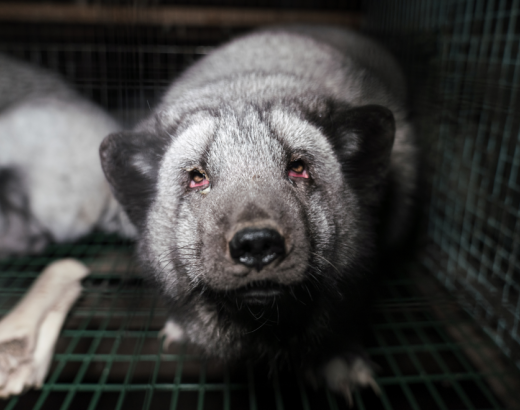We’re pressing Romania to ban fur farming on the strength of hard-hitting evidence just released from our undercover investigation of chinchilla breeding operations in that Eastern European nation. Humane Society International/Europe’s film footage and documentation paint a desperate picture of animals housed in bleak and windowless rooms, confined in cages stacked floor to ceiling, in barren, filthy and cramped conditions.
There is a particularly unseemly dimension to the cruelty involved here. The female chinchillas are often subjected to a perpetual cycle of breeding, pregnancy and birth, with one male having access to up to 10 females who are fitted with neck braces to stop them from escaping their cages during mating. In the footage, tiny babies could be seen struggling to walk on the wire cage floors, while adults frantically chew at cage bars.
The intensive confinement systems used at these fur factory farms often deprive chinchillas of the opportunity to meet their most basic biological and behavioral needs, and they certainly do not meet the standards of the Five Freedoms or of the European Union’s Council Directive 98/58/EC, which contains minimum animal welfare requirements concerning animals raised on farms.
Professor Alastair MacMillan, a veterinary consultant who viewed our footage, rendered this severe judgment of the conditions documented: “Chinchillas are naturally very sociable animals, yet on these fur farms they are kept in solitary caging. They have a strong desire to run, jump, burrow, forage for food and regularly take sand baths, and yet their tiny cages with only the very minimum of enrichment, means they are unable to exhibit these natural behaviors to any meaningful extent...Cervical dislocation—breaking the animal’s neck—is an entirely unsuitable method of killing chinchillas, and if these animals are routinely being killed this way, as some of the fur farmers admit, that will surely be a horrific end to a miserable life.”
The good news is that we now have a chance do something concrete about it. Following discussion with HSI/Europe representatives, members of the National Liberal Party have submitted a bill in the Chamber of Deputies of the Romanian Parliament to ban mink and chinchilla fur farming.
In addition, HSI/Europe has submitted evidence of its investigation to Romania’s prime minister, Nicolae Ciucă, with a formal request that the government introduce a comprehensive national fur farming ban. Should it happen, Romania would become the 15th of the 27 European Union member nations to prohibit fur farms.
There’s also potential action brewing on a broader scale. As our investigation breaks, EU citizens by the thousands are signing a European Citizens Initiative calling for an EU-wide ban on fur farming and trade. The ECI approach is one of the most effective pathways for EU citizens to press the government of the EU, the European Commission, to advance new laws. One million validated signatures from EU citizens will trigger a response.
Our sustained campaigns against fur over the last few years have deglamorized it to the extent that a raft of designers have committed not to use it, and a host of retailers now decline to sell it. Then there are the countless millions of consumers who shun it. In that light, it’s strange to have to make the economic argument against fur, but it is still sometimes necessary. In this case, we have presented data and evidence to support our view that the industry has been on the skids in Romania for some years running. In that sense, in Romania as in many other countries, the fate of this industry that has been responsible for so much animal misery and death, for so long, is sealed.



